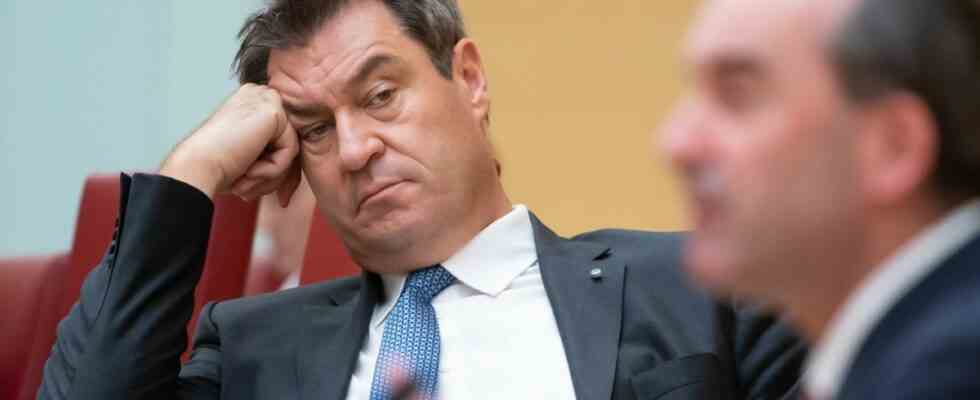If there were already a state election, the CSU and Free Voters could continue to govern. In the BR24 Bayerntrend, the representative study commissioned by Bayerischer Rundfunk, the CSU comes to 38 percent (plus one percentage point compared to the BR survey in autumn), the FW to ten. 51 percent of all respondents are satisfied with the state government. A consistent 18 percent would vote for the Greens, and nine for the SPD. The AfD recorded growth for the second time in a row, to 13 percent. With four percent, the FDP would miss entering the Maximilianeum.
At the start of the 2023 election year, this means: largely stable values, no discernible mood swings. However, the “problems” that the respondents consider urgent were mixed up: Energy policy is in first place, followed by immigration – before that, the topic was hardly in the focus of citizens.
For the CSU of Prime Minister Markus Söder, the survey means a stable situation. Nevertheless, in surveys from other institutes, a four has often been in the lead – so that the party has already started arithmetic games: If the FDP were kicked out, what value would then suffice for an absolute majority? The new survey should slow down such dreams – although Söder ranks above the historically poor result of 2018 (only 37.2 percent). An official election goal in figures was never issued, only: One wanted to continue governing with the FW.
Immigration could become an election issue again this year. According to the question, 20 percent of those surveyed rated it as the most important or second most important problem “that has to be solved as a matter of urgency”. An increase of eleven percentage points, more than double the previous value, even before climate protection. The situation in Bayerntrend before the 2018 election was completely different – even every second eligible voter was extremely concerned about migration at the time. Söder had set it as a topic herself, introduced the word “asylum tourism” and tried to keep the then emerging AfD small by shifting to the right during the refugee crisis. Remorse followed later, the former Secretary General Markus Blume said with a view to the AfD: You can’t “stink over a skunk”.
The CSU had recently raised migration in contrast to traffic lights, for example when it came to the reform of naturalization law planned in Berlin. Söder himself hardly occupies the topic anymore. The roles after the New Year’s Eve riots in Berlin were significant. At the retreat of the CSU state group in Seeon, its head, Alexander Dobrindt, mentioned groups of perpetrators in passing, but otherwise efforts were only made to portray the federal state of Berlin as a failed state – and not to heat up an integration debate. One might think: What would the CSU have done with the events of 2018?
The CSU does not want to “repeat what happened in 2018”
Influential CSU circles say that the topic will of course be addressed in 2023, wherever necessary, “not ducking away”. But “don’t repeat what happened in 2018”, it’s all a question of “tonality and choice of words”. Meanwhile, there is definitely pressure from the party: CSU district administrators complain about problems with the accommodation of asylum seekers, which is made even more difficult by refugees from Ukraine. In Twitter posts from the Junge Union in Bayern one reads that a debate on migration policy as a whole is “long overdue” or that there is “a problem with migrants from certain cultures who cannot be integrated”. And at the CSU base, one does not talk about immigration in such a differentiated way as in the state chancellery and state management anyway.
The growth of the AfD to 13 percent – the best value in the survey ever – could drive the debates in the CSU. And something else should strike Söder’s people: when it comes to asylum policy and the fight against crime, for the first time all AfD respondents were awarded competence values worth mentioning. “The AfD is slowly but surely moving out of the niche of a pure protest party,” says BR election expert Andreas Bachmann. The problem: A certain percentage for the AfD, if possible in single digits, can probably simply be written off as lost in the CSU; with such a clear double-digit value and an upward trend, it becomes more tricky.
Anyone who asks around in the AfD senses that since New Year’s Eve there has been hope that migration will be an election campaign hit. In addition, the party lacks the major populist issue. The pandemic is over, the “hot autumn” longed for by the AfD with protests about inflation never took place. “We have to make it clear that the CSU jumps off as a tiger when it comes to migration and ends up as a bedside rug,” one hears in AfD circles. At the same time, “the art” consists in not playing the subject so clumsily that middle-class voters find it “creepy” and one makes oneself “unelectable” for them. The specific course could still lead to a dispute between the hostile camps in the AfD.
The Bayern trend should also provide a topic of conversation among the Greens. They want to rule in the fall and become so strong that nobody can get past them – but remain at 18 percent. Even more striking: they lose on their core issue. When it comes to environmental policy, the respondents credit the Greens with the greatest competence; However, only 39 percent do so, in 2019 there were 61. BR expert Bachmann sees the “painful compromises” in the federal government, with nuclear power plant runtimes and the coal phase-out as the cause.

